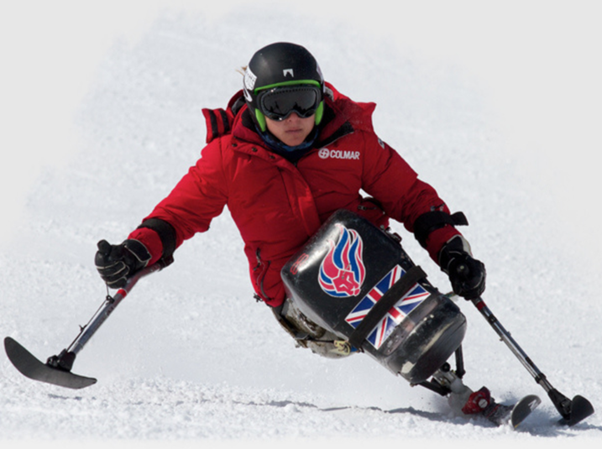Harry took part in Dame Kelly Holmes Trust’s one to one mentoring programme at Alder Hey Children’s Hospital, following a hip injury which left him on crutches for 13 weeks, and feeling low and frustrated.
The programme connects young people who are in- or out-patients with an athlete mentor with shared interests or experiences, to support their recovery, encourage physical activity and increase mental wellbeing. Harry was connected with former Paralympic Alpine Skier and World Cup medal winner, Anna Turney, whose experience and advice following her own life changing accident proved transformational in Harry’s recovery.
I was quite excited when I first heard about working with Anna. Just talking to and getting to know a Paralympic athlete!
I was a bit nervous before meeting her on Zoom but once I did, I realised that she was really easy to talk to. At that time I was quite fed up because of my injury. I was pushed over a few months before at school and my hip bone slipped out of place and I had to have an operation and have a pin put in it. I was on crutches for about 12 to 13 weeks which included the whole of the summer holidays.
Through working with Anna, I learned some coping strategies, thinking about things I could do to take my mind off my injury and think about setting some goals. One of the things I enjoyed doing was riding my quad bike, so I started doing that in a small, confined area so there was less risk, that helped to take my mind off things a bit.
When I was able to start playing tennis again, I was really frustrated as I felt like I really couldn’t play anymore. Anna helped by getting me to set some goals for playing but she also told me just to sometimes whack the ball really hard if I was particularly frustrated! Another goal I worked on with Anna was to help friends out with schoolwork which I have done.
When I first started the meetings with Anna, I was pretty down because there were so many things I couldn’t do, I couldn’t even walk. By the end, we’d talked about so many things, and we’d talked about all the things that I ‘could do’ while on crutches, so it was good to focus on what I could do, like swimming or upper body work at the gym, rather than what I couldn’t.
I’m back to playing tennis twice a week now and also play cricket and hockey.
I would definitely recommend this programme to other people. It cheered me up and gave me someone to speak to which I found really useful.”
Harry

Harry is an incredibly positive and thoughtful young man who aims high, is easy to connect with and bravely explored the challenges he was facing with a focus on solutions. Harry had been using crutches for over three months, following an incident at school in May. As a sporty young person and talented tennis player, he found this reduced mobility difficult and frustrating. He withdrew from seeing his friends and became lonely, low in confidence and down during the long summer holidays, without friends and sport to fire his adventurous and fun-loving spirit.
From the very first session he was engaging and open about the challenges he was facing. Harry aimed high from the start, setting personal goals in the first session, to go out and walk the dog five times a week. He also decided to give tennis a go, despite his injuries. His mum suggested working on self-belief and confidence. He stuck to his goals and we explored the frustrations he found getting back to tennis with his reduced mobility and having not played for months, and we looked at how he could use the learnings from this challenge, in life and how best to manage his emotions. In the third session, Harry was happier and had developed an effective daily routine. The highlights he expressed were having someone to talk to and be listened to and finding the fun in life again. Harry is a mature young man who rises to the challenge of difficult questions. It has been a pleasure to help him think through some challenges and to see him relax and grow with the programme.”
Anna

Harry talked to Anna about his injury during that first meeting because he was quite fed up about his injury and it was nice to have someone else to talk to.
We went back to the clinic at the hospital after a few weeks and we were hoping that at that point, Harry would be able to do full weight bearing activities, but the doctor said he had to carry on using crutches and not to pull full weight through his bad leg. This was at the start of the summer holidays so was quite tough to take. The first appointment with Anna was around this time which was really good timing as Harry was really feeling down. It was just good to have that additional support from Anna and the Ready, Steady, Go programme.
Lads don’t always talk much, so I always felt that it was a good idea to have a person like Anna to talk to, especially someone who’d had an accident like she had and to talk through what coping mechanisms and strategies she used.
The goal setting was really useful for Harry. Anna was really getting Harry to think about what he could do and how he could get back into activities and really giving him some motivation.
Harry’s mum, Lisa added
